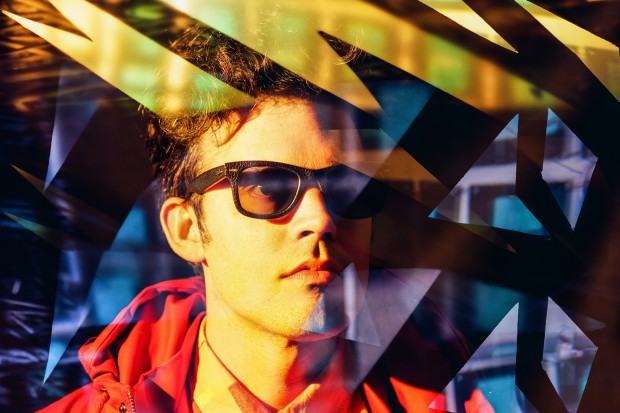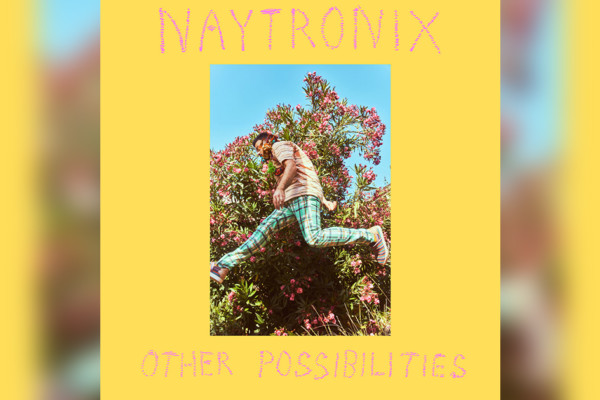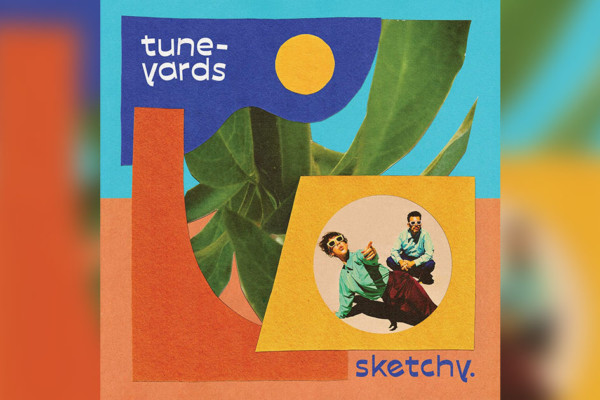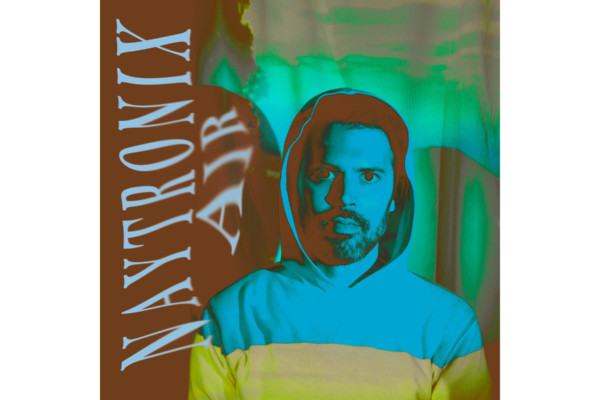Mr. Divine: An Interview With Nate Brenner

As a member of the eclectic band Tune-Yards, Nate Brenner spent much of the past few years touring the world in a blur of tour busses, hotels, and planes. The experiences helped to shape the music in the bassist’s own project called Naytronix, culminating in the new release, Mister Divine.
Trained in jazz at Oberlin Conservatory, Brenner has a deep understanding of harmony and rhythm that he brings to the table with strong, memorable bass lines. Mister Divine also brings diverse interests together with African and Caribbean rhythmic ideas woven into the album’s ethereal fabric.
We caught up with Brenner to get the scoop on Naytronix, the new album, and his tips for handling life on the road.
Where did the name Naytronix come from?
I started recording and writing my own music, and I started joking around with one of my friends about it. One of my friends in high school called me Natron, like Deltron 3030, but I didn’t want to just rip them off so a buddy of my friend suggested “Natronix”. I like it, and when I decided to spell it with a Y it just had a nice ring to it.
It’s funny because last night I was having dinner with a friend and talking about after a couple albums just going back to Nate Brenner or something. [laughs]
Do you feel like you need to have a separation from your actual identity to make this music?
I like the idea of having a project versus being my own name. If it’s a band, it can have a set existence and I can be doing other projects at the same time, even under my own name. In terms of bands, I like the set beginning and ending – like a trilogy of three albums – versus as a solo artist using your own name. You can do that for your entire life. There’s pros and cons for both, but I was just into the idea that Naytronix will be a 10-year period or so and it will end. I will always be doing music, but it’s cool to think of Naytronix like a series or comic book that has a definite start and ending.
Like an era of your music?
Exactly. Hopefully I’ll always make records, but it’s nice to separate myself, too, so that my whole identity doesn’t get wrapped up in it. If people don’t like the record, then it’s not like they don’t like me. [laughs]
Your style has a many facets to it. Do you see it as an evolution of everything you’ve been playing?
In a way it’s an evolution, but making music for me is like my daily practice. I started as a bass player, and as a bass player I was just practicing all the time for most of my life. Working on scales, apreggios, transcriptions… Just putting in time on the instrument. In the last three or four years I had an epiphany that I wanted to do that with music. It doesn’t have to be perfect, but it’s more about working on the process every day. Obviously you have to finish something and put it out, but I go to the studio and work on making music every day in the same way that I would shed scales and stuff like that.
In that way, it’s always evolving and I hope that I’ll always be getting better at it. You have to look at that long term approach where you put in the time every day.
You studied bass at Oberlin Conservatory. Was there a point where you felt you had to release yourself from heavy music theory? This music is deep in its own way, but a lot of it gets back to a more folk or roots based style.
Going to Oberlin was amazing, but a few years after I graduated I started writing music. Up until that point it was mostly just playing the bass. I had this realization where a lot of the music I wanted to listen to wasn’t that necessarily advanced. A lot of it was simple and I felt I had enough basic skills to start making music and shift from studying it to actually writing.
When you’re in the conservatory, you can spend your whole life studying and analyzing music. I just wanted to start being creative and get away from all the technical stuff. I think it’s hard for anyone that goes to music school, because at what point do you say, “Ok, I’m good enough to be playing music,” versus constantly practicing. It’s a challenge for me and a lot of my friends to just be confident. In a lot of ways, you feel like you’re never going to be good enough. It’s a lot of mental clutter. Instead of being in the moment and making music, you’re thinking about what you need to be working on or what you could do better.
Tell me about the writing process for Mister Divine.
I wrote it off and on the road with Tune-Yards. It took me two years to write it. For the first year, I was in Oakland and me and [Tune-Yards front-woman] Merrill Garbus were working on the tune-yards record. The second year, we were basically on the road the whole year.
Did you take a lot of inspiration from your experiences on the road?
Yeah, I think it really helped me get to the point where I felt good about the music. It helped just working on it in all these different environments and getting out of the regular routine of going to the studio. I think being in these uncomfortable situations where you’re not getting a lot of sleep or riding in a van for eight hours or something, you get really creative ideas in those situations. It felt special to be working on it in those situations.
Your playing seems to have a lot of Afro-pop influence. How does that fit into the mix?
In 2013, Merrill and I started studying Haitian drumming with a teacher in Oakland. A lot of those rhythms were based on triplet feels where they don’t always emphasize the first beat of the triplet. It’s really disorienting for people that are used to hearing the downbeat. I feel like I just scratched the surface on that stuff, but when I was recording the album the rhythms just seeped into it with the triplet feels and 12/8 stuff. I’ve also been a big fan of William Onyeabor, who was a Nigerian synth funk instrumentalist and singer from the early ’80s.
Do you get deep into African bassists, too, or is it more about the drumming?
I think mostly the drumming. Some of the lessons I took, the drum instructor would have me play bass. I’d play the same rhythms people were playing on the drums, but I’d break it up into an arpeggio on the bass. He would sing the different notes for me, too. A lot of the time I’d be playing cowbells and stuff, though. [laughs]
Do you think it’s worth it to learn other instruments like that?
I think it’s really helpful for bass playing, especially for drums. Every instrument will help your musicianship and not just for bass. I’ve always felt that if someone picks up another instrument, it’s only going to help their primary instrument. Just seeing how the instruments function together [is helpful]. I actually started on drums before I started bass, so that gave me a nice perspective of being rhythmically accurate and holding it down on my own instead of relying on a drummer. I wanted to be sure that if there’s no drummer there, I can still play with a pocket and have a groove.
Does the bass line to “Dream” come from that mentality?
That was one of the songs that I felt I was using some of the Haitian rhythms. I put it in 6/4. That was one of the songs where I went into the studio and programmed a drum machine and came up with that beat. I used an Electro-Harmonix POG with a little octave up and a little octave down, then basically came up with that riff. I wanted to develop the song based on that bass line and double the chorus vocals with the bass line.
Are you a gear head or do you just do what gets the job done?
Mostly I just do what gets the job done. I’ve started to use a lot more pedals, but I’d say I’m more of a “minimal amount of gear for maximum results” kind of guy. My background for most of my life is just with the upright bass with minimal amping. Slowly I’ve been getting more into synthesizers. I’m more interested in having strong bass lines and strong melodies rather than a lot of fancy stuff. But I like both. [laughs]
The final track, “Shadow”, has a fairly short ending, like a final breath that leaves you hanging a little bit. Was that the intention?
When I was writing that one, I knew I wanted to go into the little drum break part, but part of me thought, “Instead of coming to a climax, what if it just slows down?” It felt right and it’s a little different in that way.
You’re about to head out on a month long tour. What’s a Naytronix performance like?
I want to make it a pretty exciting show. I’m bringing a projector to do some live visuals that I have hooked up to some of my synthesizers and a sampler. Basically, a lot of the songs I’m extending so it’s more of a dance/jam/freakout thing. The album is fun, but there are some more mellow parts. For the live set, I hope that it’s really just a fun experience that people dance to. I want to make it like a live DJ set where every song blends into each other and they all have a lot of energy.
You’ve spent a ton of time on the road. What touring tips do you have to share?
The biggest one is not to drink a lot of alcohol. [laughs] If you’re constantly partying, every day you’re starting from a loss and it becomes a struggle. I think it’s important to stay healthy and get enough sleep if possible. I think it’s helpful to think of yourself as an athlete. If you’re an NBA player, hopefully you’re not going to be getting wasted every night. [laughs] You have to approach it like that. Treat your body with a lot of respect and put in the right types of food and beverages.
I think you’re ruining everyone’s desire to go on tour!
[laughs] I know, but that’s the way you’ve got to go. Otherwise, you’re just going to be hungover all the time. The more you do it, the easier it is. I try to think of the long-term effects of what you put in your body.



